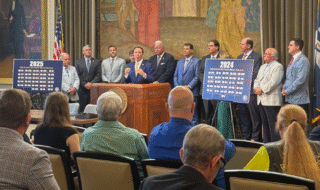February 12, 2024
NFIB Minnesota outlines the 2024 Small Business Agenda, releases ballot results on key issues before the Legislature.
ST. PAUL (Jan. 12, 2024) – Ahead of the start of the Minnesota Legislature’s 2024 session, NFIB State Director John Reynolds highlighted the priorities of local job creators and shared findings from a recent ballot of NFIB Minnesota members on key issues before the Legislature.
“Rising costs continue to take a toll on small business owners and the hardworking Minnesotans they employ. Last session, lawmakers imposed an unprecedented slew of unfunded mandates and tax increases. This year, proposals for billions in new spending and more mandates on small business owners are already making the rounds. On behalf of our more than 10,000 members across Minnesota, we ask lawmakers to stop the mandate madness and come together to help Main Street address their biggest challenges.”
The 2024 Small Business Agenda
NFIB was founded on the principle of one member, one vote. We ballot our members about key federal and state issues throughout the year. Each NFIB member, regardless of business size or contribution amount, gets one vote about the position NFIB should take on key small business issues.
Small business owners need mandate and financial relief. NFIB supports the following measures to help Main Street regain its footing after four challenging years:
Small Business Tax Relief: Minnesota now has the highest corporate tax rate and one of the highest individual tax rates in the country. Both are hard on small business owners. To help them compete, we support the gradual creation of an across-the-board small business income tax rate of 4.9% – or half the current corporate rate – on income up to $5,000,000.
Prevent Lawsuit Abuse: Abusive and predatory ADA lawsuits disproportionately impact small businesses and often target independent, minority-owned stores. We support extending the current protections against ADA lawsuit abuse to prevent frivolous litigation over website design.
PFML Reform: NFIB Minnesota opposed the creation of a state-run Paid Family and Medical Leave program because of the cost and burden on small employers. Our warnings about higher-than-expected program costs proved correct and we believe it will get worse without significant reform. We looked at best practices in other states and issued recommendations to rein in the cost and reduce the burden on small employers.
ESST Reform: Many small business owners were blindsided when the Earned Sick and Safe Time (ESST) mandate took effect in January. Despite going into law in May, the Minnesota Department of Labor and Industry (DLI) did not issue initial guidance until late October. Pages of additional guidance were published in early December – less than a month before the law took effect – leaving small business owners scrambling to comply. We support common sense steps to reduce the cost and make the program more workable for small businesses.
New Positions For 2024
Earlier this year, we asked Minnesota small business owners to weigh in on key issues that may come before the Minnesota Legislature in 2024.
Low Carbon Fuel Standard: 91% of small businesses oppose mandating a low carbon fuel standard (LCFS) in Minnesota. As LCFS emission reduction targets ratchet up, the cost of fuel continues to go up. According to the California Legislative Analyst’s Office, LCFS is expected to cost drivers in the Golden State an extra 46 cents per gallon of gasoline and 50 cents per gallon of diesel by 2030.
Independent Contractor Restrictions: 84% of small businesses oppose the imposition of an “ABC” test on working as or hiring independent contractors. This restrictive test will worsen Minnesota’s worker shortage by banning the use of freelance workers in many circumstances. CLICK HERE to learn more about small business owners’ perspective.
Payroll Tax-Funded Childcare Subsidies: 96% of small businesses oppose the enactment of a new payroll tax to fund childcare subsidies. Last year, Vermont became the first state to tax paychecks to fund additional subsidies. Minnesota already added a new payroll tax of up to 1.2% to fund the Paid Family and Medical Leave (PFML) mandate, eating into small businesses’ bottom lines and workers’ paychecks.
Job Posting Salary Range: 89% of small businesses oppose requiring employers to include a salary range in every job posting. Small employers are already facing complex new hiring and labor regulations enacted at the state and federal level over the past year. More restrictions will only make it harder to hire and invite expensive lawsuits.
NFIB is a member-driven organization advocating on behalf of small and independent businesses nationwide.
Related Articles














